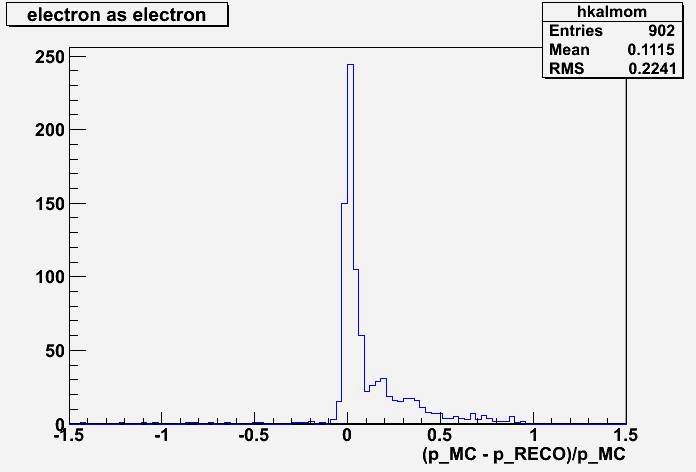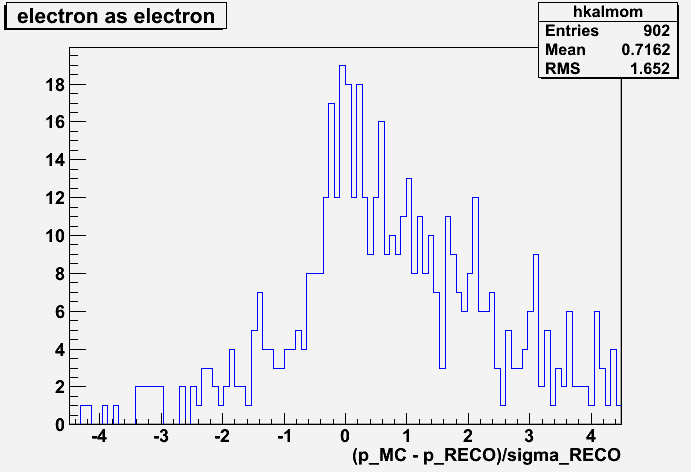Home » PANDA » PandaRoot » Tracking » Tracking: Kalman Task with STT,(electron hypo)
| Re: Tracking: Kalman Task with STT,(electron hypo) [message #11404 is a reply to message #11400] |
Thu, 23 December 2010 21:54   |
Lia Lavezzi
Messages: 291
Registered: May 2007
Location: Torino
|
first-grade participant |

From: *47-151.net24.it
|
|
Hi Soeren,
sorry for the late reply. I tested the macros without the added Urban, i.e. setting the value of gcalpha = 1 in Geane.C.
In the reconstruction of the electron as a muon nothing changes, while the distribution and the pull of the electron reconstructed as an electron changes:


The momentum distribution is much more similar to the one reconstructed as a muon, but the pull distribution is not good.
It seems that the reason for the electron behaviour is indeed the Urban model correction, but the shape of the momentum distribution and the pull distribution are better with the Urban correction, though the peak is larger.
Answering also to Stefano:
| Quote: |
I still do not understand; let's forget about the tails, for the moment:
Muon: p_rec - p_mc narrower, p_rec - p_mv / sigma broader
EWlectrons: p_rec - p_mc broader, p_rec - p_mc / sigma narrower
->
Muons: sigma smaller
Electrons: sigma bigger
Muons have a better residulas, but small errors (why?)
Electrons have larger residuals, and larger errors.
I would suppose that errors for muons should be larger, and also the residuals, considering that this is the wrong hypothesis. Electrons should fit better the points, with a reduced residual and properly calculated errors. But this does not appear.
I continue to think that there is something wrong somewhere for electrons.
|
the errors are smaller for the muons because the bremsstrahlung contribution is not taken into account, while it is for the electron.
The point is that here we are considering the kalman fitted result, so a different error means also a different result when you compare the extrapolated error to the measured hit one. Then if you have different errors, you get different results after the filtering step and then different momentum distributions. The momentum itself does not come only from the extrapolation of the mean value.
To understand completely the GEANE contribution, I think we should consider the pull distribution just after an extrapolation, without the kalman procedure, maybe just extrapolating the tracks on a plane, taking as starting momentum and position the MC ones.
Regards,
Lia.
|
|
|
|
 |
|
Tracking: Kalman Task with STT,(electron hypo)
By: M.Babai on Tue, 21 December 2010 11:47 |
 |
|
Re: Tracking: Kalman Task with STT,(electron hypo)
|
 |
|
Re: Tracking: Kalman Task with STT,(electron hypo)
By: Anonymous Poster on Tue, 21 December 2010 12:11
|
 |
|
Re: Tracking: Kalman Task with STT,(electron hypo)
By: M.Babai on Tue, 21 December 2010 12:20 |
 |
|
Re: Tracking: Kalman Task with STT,(electron hypo)
|
 |
|
Re: Tracking: Kalman Task with STT,(electron hypo)
|
 |
|
Re: Tracking: Kalman Task with STT,(electron hypo)
|
 |
|
Re: Tracking: Kalman Task with STT,(electron hypo)
By: M.Babai on Tue, 21 December 2010 12:11 |
 |
|
Re: Tracking: Kalman Task with STT,(electron hypo)
|
 |
|
Re: Tracking: Kalman Task with STT,(electron hypo)
|
 |
|
Re: Tracking: Kalman Task with STT,(electron hypo)
By: M.Babai on Thu, 23 December 2010 10:32 |
 |
|
Re: Tracking: Kalman Task with STT,(electron hypo)
|
 |
|
Re: Tracking: Kalman Task with STT,(electron hypo)
|
 |
|
Re: Tracking: Kalman Task with STT,(electron hypo)
|
 |
|
Re: Tracking: Kalman Task with STT,(electron hypo)
|
 |
|
Re: Tracking: Kalman Task with STT,(electron hypo)
|
 |
|
Re: Tracking: Kalman Task with STT,(electron hypo)
|
 |
|
Re: Tracking: Kalman Task with STT,(electron hypo)
|
 |
|
Re: Tracking: Kalman Task with STT,(electron hypo)
|
 |
|
Re: Tracking: Kalman Task with STT,(electron hypo)
|
Goto Forum:
Current Time: Wed Jul 09 12:37:41 CEST 2025
Total time taken to generate the page: 0.00784 seconds
|
 GSI Forum
GSI Forum






